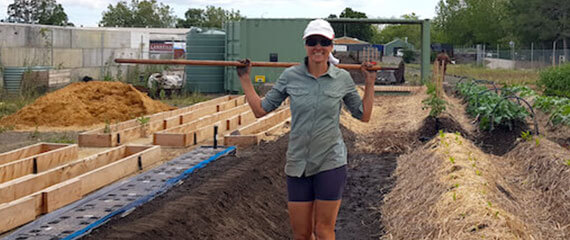Horticulture and Urban Agriculture
WaterUps wicking improving organic vegetable gardens
Vegetable Garden Beds do better With WaterUps
High yield vegetable garden beds and food security are becoming increasingly important for urban planners, particularly with ongoing supply chain issues in Australia and abroad.
Approximately fifty years ago, the outskirts of Australia’s major metropolitan areas were home to vibrant market gardens on some of our best fertile ground. Sadly, urban sprawl has seen the decline of many food and vegetable gardens, The Redlands in Brisbane being one such example.
This is why most councils across Australia are encouraging a growing network of community gardens, city farms and commercial enterprises to produce locally grown food in their neighbourhoods.
With our commitment to providing innovative sustainable solutions for improving food security, WaterUps® is an advocate for the revival of horticulture and city farms.
Our WaterUps wicking solutions are the key to making these food farms more productive and managing major costs associated with watering and maintenance.
Why use WaterUps?
WaterUps – both our company and products – provide a several benefits to horticulturalists and urban farmers.
> Overcomes unique issues of urban farming
WaterUps provides a unique solution for many of the problems related to urban farming:
Issues such as soil contamination, brownfield development, and embedding agriculture in an urban setting can all be successfully addressed with WaterUps. This is generally site specific and can involve a combination of raised, greenhouse and inground growing situations. The use of WaterUps will maximise crop yields.
> Delivers outstanding savings in water and time.
First introduced in 2016, WaterUps uses our patented wicking bed designs to water vegetable garden beds from the ground up, with plants drawing up water and nutrients according to their unique requirements. This makes the watering of horticultural plots incredibly efficient and cost-effective.
Studies undertaken in Sydney in 2018 found that when WaterUps is used in raised vegetable garden beds, it results in an 80% saving in the water compared to what is normally used for surface watering.
When used in in-ground garden beds, WaterUps saves up to 66% of the water used in top-down watering scenarios with 60% more coverage due to horizontal wicking.
That’s a huge saving of water wastage and over watering, representing savings in the cost of water – and in the time spent watering.
WaterUps also delivers another major saving when it comes to water – the system captures and stores rainwater for irrigation instead of draining away. The wicking beds sit in a reservoir with 1m2 being able to hold 51 L of water. In non-wicking garden beds rain can also wash away nutrients from the soil. In WaterUps systems nutrients are retained into the system and not lost.
> Produces Healthier plants & longer harvests
WaterUps has proven its ability to grow healthier plants by maintaining a consistent moisture level in the soil and a steady supply of nutrients to the root, enhancing plant cell development. This approach has resulted in more resilient plants that flower and produce fruit and vegetables over longer periods.
> Enables a Learnings Network
Across our network we continue to work with leading horticulturalists and academics, including being involved in field trials, to better understand how to capitalise on the potential of WaterUps, soil and plant types to further food production.
You can find resources on our website, starting with this article.
The WaterUps System for Vegetable Growers
Most horticultural implementations have long garden beds that are either raised in greenhouses or in-ground. The optimal solution for these set-ups is the WaterUps® Sub-Irrigation Channel [‘SIC’], which measures 1340 x 470 x 160mm. This channel has our wicking cells enclosed in a channel or trough – the reservoir – saving gardeners from having to use a pond liner.
The channel can easily be added to through connection pipes along the 470 mm end.
You can explore our full product range out here.
Urban Horticulture Projects – productive vegetable garden beds
Here are two urban farms that have been using WaterUps to improve the yield from their vegetable garden beds.

Pocket City Farms
WaterUps installed our first beds at Pocket City Farms in early 2019 as a trial. A few months later a further 11 timber beds were installed along the street frontage to grow leafy greens, fennel, and other small rooting vegetables. This allowed the farm to increase food yields.

Melbourne Food Hub
In November 2019, WaterUps were installed at the Melbourne Food Hub, in the first commercial trial of our in-ground wicking beds system.
